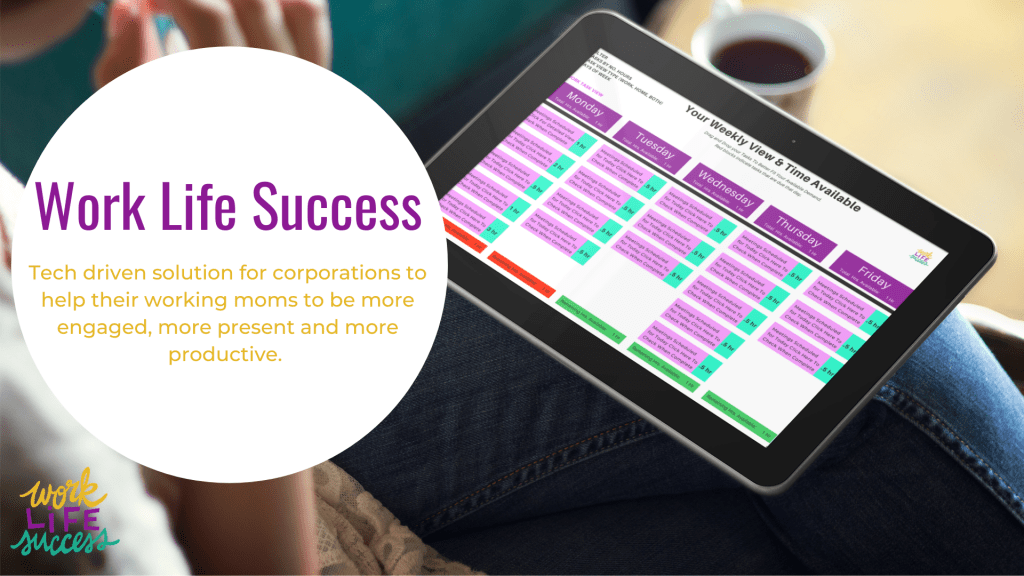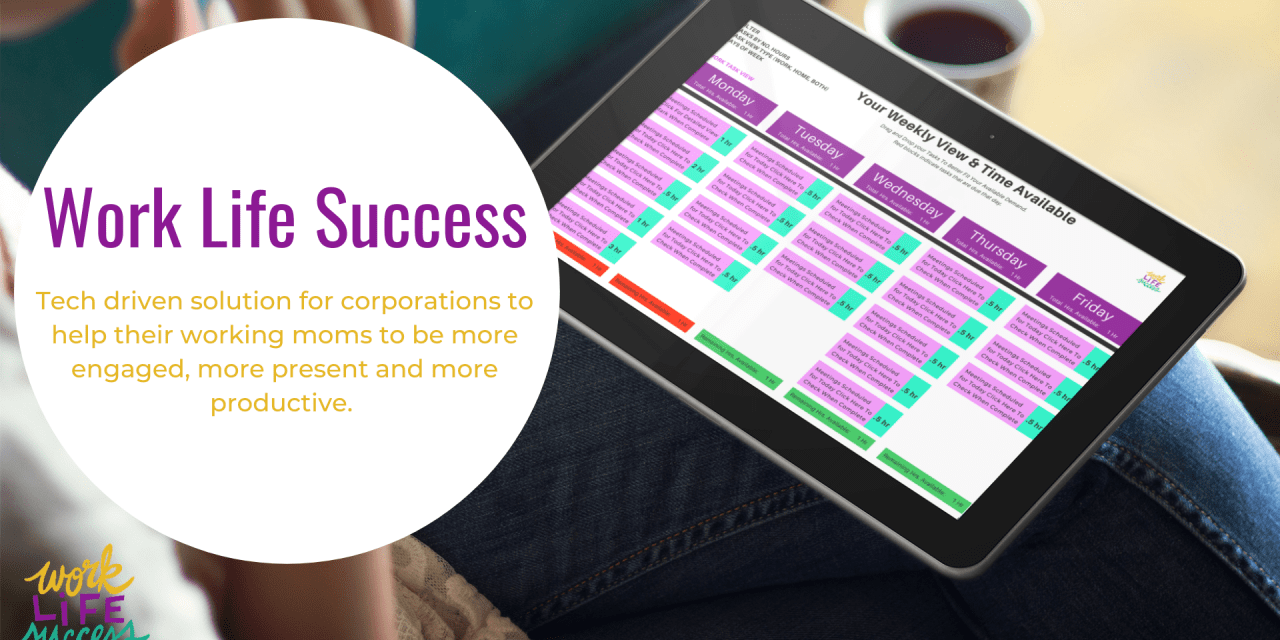Striking a successful work-life balance is tough if you’re a female executive wanting to start a family. Regardless of one’s thoughts on gender associations, there are facts in play that need to be considered. TODAY shares via a headline that “Women do 2 more hours of housework daily than men.” Related to this, Workplace Insight’s article titled “Women less likely to progress at work than male colleagues after childbirth” states that “Only 27.8 percent of women are in full-time work or self-employed three years after childbirth, compared to 90 percent of new fathers. And while 26 percent of men have been promoted or moved to a better job in the five years following childbirth, the figure is just 13 percent for women.”
As both a mother of four and a CEO herself, Domonique Townsend can empathize with the exhausted mothers who want to run a successful enterprise, but just don’t have the energy. Domonique’s We Optimize Work is a startup service that specializes “in working with Mom CEOs and business leaders who seek solutions for their working parent demographic.” Under her website’s section for “Worked, Trained, Coached, Keynotes,” she lists companies she has worked with like Ingram, Chromalox, ConAgraFoods, and Schneider Electric.
Domonique’s We Optimize Work is driven by her past work history as an engineer and Certified Lean Six Sigma Black Belt. Her business operates with the goal of mitigating, if not erasing, the predicted loss of productivity amounting to $341 billion for U.S. corporations over the next year if resources aren’t allocated to support the productivity and welfare of working mothers.
We Optimize Work has been operational since March 2019, which has been long enough for Domonique to fine-tune her approach to working moms. Her focus niched down, Domonique’s tech solution “Work Life Success” is a playbook to help mothers work around the complexities of their home lives.
Domonique explains the approach of the new service launched in May 2020, saying, “Work Life Success is an all-inclusive solution that uses engineering principles to help companies improve engagement, productivity, and well-being [to bring about the] success of working mothers. Working Moms have the ability to customize action plans that align with their demand. In addition, they receive live virtual, weekly coaching and consulting support that provides real-time expertise to challenges they may face and strategies to apply for their continued success… over the course of four weeks. So it’s a four-week accelerator, and corporations pay us to help working moms through this accelerator option.”

We Optimize Work is helping companies close the gender pay gap, which she says will increase by up to 50 percent without a working solution for mothers impacted by COVID-19’s economic fallout. Whether or not a working mother’s children are in school, Domonique says that being a parent and a member of the workforce is “a challenging dynamic.” This is chiefly due to corporations still trying to hold onto the traditional understanding of work, instead of a flexible, virtual setting that’s hot on the heels of COVID-19 remote work options.
The push to reduce the gender pay gap transcends a social desire to see more women make money. Domonique says that support for working moms shouldn’t be seen as a special privilege. Companies not invested in making sure that their employees earn more money can suffer a profitability loss, caused by absorbing the costs sustained from not retaining capable female employees (e.g., slowed productivity caused by the lost employee, time and financial costs of searching for a replacement, training costs, etc.).
“Your ability to reach results, your customer base, will decrease,” Domonique says. “Your revenue will decrease.” She also points out that the probability of the company succeeding is increased by 15 percent when it has a diverse workplace environment—particularly with moms involved in leadership roles in a company.
“It’s more of an investment in supporting solutions that allow them [employees] to be successful,” Domonique explains. “Not only just happiness but valuing them beyond looking at ‘9-to-5’ as a success factor… For working moms, especially working from home, that is something that is not as likely to be [continued] day-to-day… they’re undervaluing them.” She adds that 70 percent of companies do not currently offer flexible work options.
It’s not the fault of an insensitive office culture that moms are undervalued. We Optimize Work was founded because Domonique saw that many working moms were afraid to advocate for themselves. Further, many women might feel that any struggles they face at home might seem out of place to bring up at the office. Domonique says of the companies she serves with We Optimize Work that, “They do not have that level of awareness because no one is bringing it to the table.” Domonique feels that a lot of mothers are used to toughing out a situation, regardless of how unfair or challenging it may be.

We Optimize Work is helping companies close the gender pay gap, which she says will increase by up to 50 percent without a working solution for mothers impacted by COVID-19’s economic fallout. Whether or not a working mother’s children are in school, Domonique says that being a parent and a member of the workforce is “a challenging dynamic.” This is chiefly due to corporations still trying to hold onto the traditional understanding of work, instead of a flexible, virtual setting that’s hot on the heels of COVID-19 remote work options.
The push to reduce the gender pay gap transcends a social desire to see more women make money. Domonique says that support for working moms shouldn’t be seen as a special privilege. Companies not invested in making sure that their employees earn more money can suffer a profitability loss, caused by absorbing the costs sustained from not retaining capable female employees (e.g., slowed productivity caused by the lost employee, time and financial costs of searching for a replacement, training costs, etc.).
“Your ability to reach results, your customer base, will decrease,” Domonique says. “Your revenue will decrease.” She also points out that the probability of the company succeeding is increased by 15 percent when it has a diverse workplace environment—particularly with moms involved in leadership roles in a company.
“It’s more of an investment in supporting solutions that allow them [employees] to be successful,” Domonique explains. “Not only just happiness but valuing them beyond looking at ‘9-to-5’ as a success factor… For working moms, especially working from home, that is something that is not as likely to be [continued] day-to-day… they’re undervaluing them.” She adds that 70 percent of companies do not currently offer flexible work options.
It’s not the fault of an insensitive office culture that moms are undervalued. We Optimize Work was founded because Domonique saw that many working moms were afraid to advocate for themselves. Further, many women might feel that any struggles they face at home might seem out of place to bring up at the office. Domonique says of the companies she serves with We Optimize Work that, “They do not have that level of awareness because no one is bringing it to the table.” Domonique feels that a lot of mothers are used to toughing out a situation, regardless of how unfair or challenging it may be.

Speaking to the endurance of many mothers she’s worked with, Domonique says, “I think it’s more so that moms are more apt to figure it out…. They’re typically the role where things always fall on them—and they are figuring it out. I think there is an opportunity for moms to ask for more help.”
We Optimize Work engaged with over 75 working moms during the pandemic to survey what areas could be improved in their work situation. According to the responses received, Domonique found that most moms needed help with better time management and achieving a clearer understanding of what companies expect from them. She says that many moms wanted to know how they could meet the needs of work—without sacrificing other parts of their lives. She also found that many women have to redefine “success” since their schedules and priorities are now different.
“50 percent of them stated that they’re uncomfortable [with] appearing incapable,” Domonique says. “And they do not want to be laid off. That’s a real reality.”

What Domonique is referring to has been called “The Motherhood Penalty,” and according to CNBC, it costs women $16 annually in lost wages. She says that being a working mom will affect what work the women are given, as co-workers will assume that working moms won’t be able to perform certain job tasks.
That vanishing of finances is something that Domonique does not accept. When she was working as a mom, her mentors both inside and outside of her former job showed her how to achieve a healthy balance of responsibilities. And because she knows that there’s a virtual village of mothers who feel isolated, We Optimize Work is setting a goal of impacting 10,000 working moms over the next 12 months. Domonique states, “It’s a very aggressive goal, but I do feel like I can do it with the help of resources and people that I partner with that also have similar focuses in supporting the working mom demographic—and helping companies succeed in how they support the working parent.”
We Optimize Work is currently taking consultations. For further information about We Optimize Work, be sure to visit their website and Domonique Townsend’s social media.








